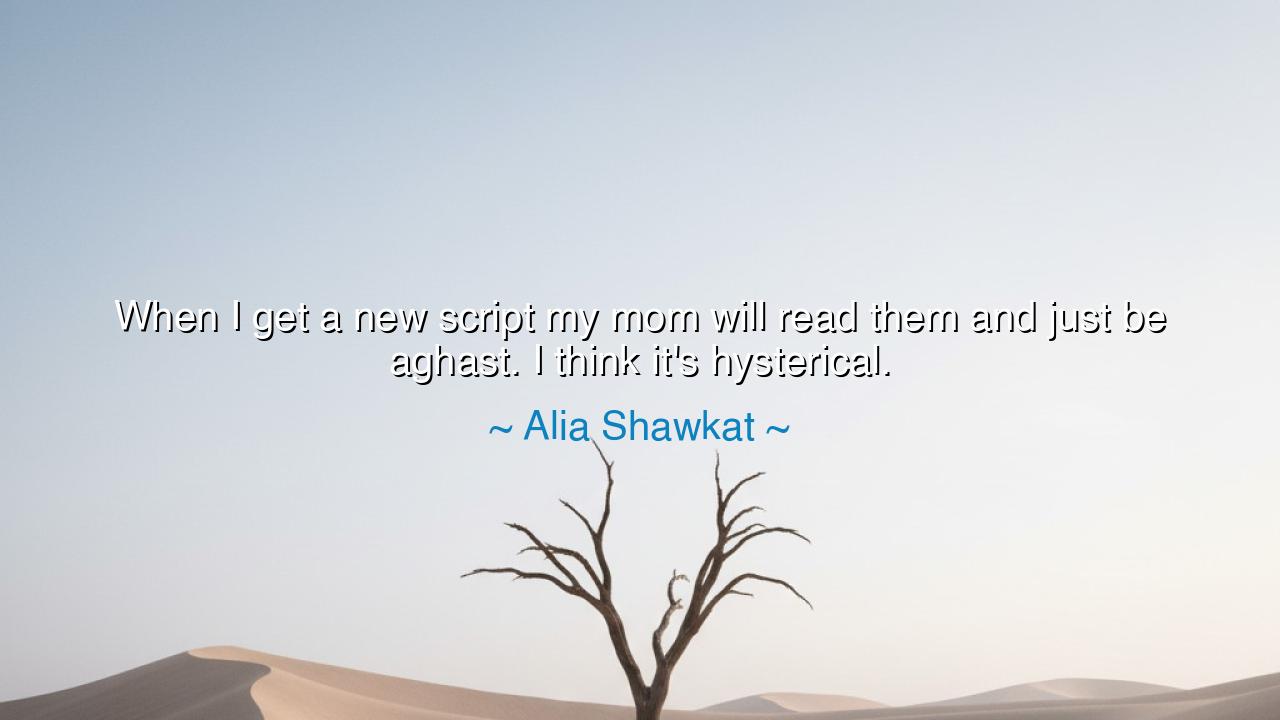
When I get a new script my mom will read them and just be aghast.
When I get a new script my mom will read them and just be aghast. I think it's hysterical.






“When I get a new script my mom will read them and just be aghast. I think it’s hysterical.” — thus spoke Alia Shawkat, and in her words lies a timeless truth: that the bond between generations is often marked by tension, laughter, and love. The mother, keeper of tradition and protector of virtue, encounters the wild landscapes of modern art with shock. The daughter, child of change and seeker of expression, encounters that shock with amusement. What could divide them instead becomes a source of humor, a dance of old and new, fear and freedom.
The mom here is not only an individual, but an archetype—the voice of caution, of propriety, of what is deemed acceptable by the standards of her age. She reads the scripts, filled with daring ideas, bold themes, and irreverent humor, and responds with aghast astonishment. Yet her very reaction reveals the power of art: it challenges, unsettles, and shakes us from the comfort of custom. Without this jolt, there is no transformation.
The daughter, by contrast, does not recoil but laughs. She sees in her mother’s shock not condemnation, but the natural clash of perspectives. To her, it is hysterical, a reminder that the path of the artist is always to unsettle one generation in order to awaken the next. This laughter is not disrespect but wisdom: it disarms fear and turns conflict into connection. Through humor, Shawkat bridges the gap between her own daring spirit and her mother’s protective heart.
Consider the story of Galileo Galilei, who, when he unveiled the truth that the Earth moves around the Sun, shocked the guardians of tradition. The scholars and priests of his time were aghast, for his revelation unsettled the very order they believed in. To Galileo, however, the reaction was proof of the importance of his discovery. Truth, like a bold script, has the power to shock. And though he did not laugh, his persistence in the face of their astonishment paved the way for the modern world.
The origin of Shawkat’s reflection is thus rooted in the eternal struggle between innovation and tradition, between the artist’s daring voice and the parent’s cautious love. This tension has existed in every age. Yet when it is met with humor rather than anger, it becomes not a wall but a bridge. The artist learns patience, the parent learns openness, and together they move toward greater understanding.
The lesson is clear: do not fear the shock of others when you live or create authentically. Their aghast reaction may be the very sign that you are breaking ground, pushing boundaries, and opening new doors. And when those closest to you react with disbelief, respond not with bitterness, but with laughter. For humor can transform resistance into dialogue, and shock into shared humanity.
Practical action follows: if your art, work, or choices unsettle those around you, do not retreat in shame. Stand firm in your vision, but temper it with grace. Allow yourself to laugh at the gulf between generations and perspectives, for laughter keeps the heart open where argument would close it. Likewise, when confronted with something that unsettles you, pause before judgment; perhaps it is the seed of change.
Thus Alia Shawkat’s words rise as more than a personal anecdote: they are a teaching about courage, creativity, and love. The script may shock, the mom may be aghast, but the daughter’s laughter transforms the clash into connection. This is the eternal rhythm: art disrupts, tradition resists, and laughter reconciles. May we all learn to meet the shocks of life not with fear alone, but with humor, patience, and the courage to keep creating.






AAdministratorAdministrator
Welcome, honored guests. Please leave a comment, we will respond soon